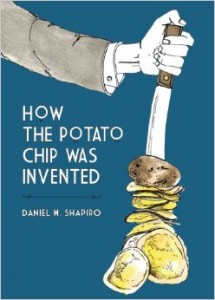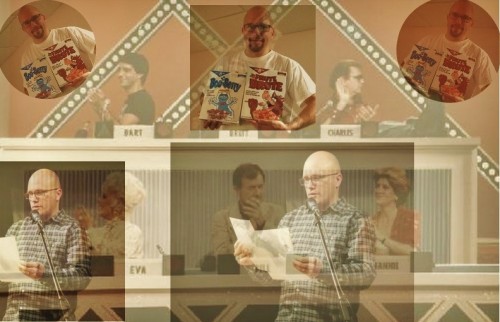Daniel Shapiro: Why Shld I Read YOUR Book ??
ok, Daniel, so why should we read YOUR book ???
Why should you read my book? Until recently, I might not have known, but after the death of Robin Williams, something happened: A number of people took to Facebook and Twitter, and some debated the role of popular culture in our society. One person asked, “Why are we so sad about a celebrity when there are more substantial things to worry about?” Another wrote, “I can’t believe this. I remember watching him on ‘Mork and Mindy.’ I was supposed to be in bed, but I would sneak downstairs to the console TV,” etc. Somebody reminded us to talk to someone when we’re depressed, and another chastised that person for suggesting depression could be cured via hotline.
Like my Facebook friends, my recent book of poems, How the Potato Chip Was Invented, wrestles with the concept of fame. Its audience may include people who are obsessed with celebrities, sometimes to the point of emotional fragility, anger, confusion, self-righteousness, elitism, or many more options. Even people who claim to hate celebrities are obsessed with them, too, taking time to criticize others for their celebrity worship. My poems are about this worship, but they don’t take part in it. Some of the poems are imagined scenarios that humanize celebrities more than we’re used to seeing them humanized. Others attack celebrities who have become a nuisance.
obsessed with celebrities, sometimes to the point of emotional fragility, anger, confusion, self-righteousness, elitism, or many more options. Even people who claim to hate celebrities are obsessed with them, too, taking time to criticize others for their celebrity worship. My poems are about this worship, but they don’t take part in it. Some of the poems are imagined scenarios that humanize celebrities more than we’re used to seeing them humanized. Others attack celebrities who have become a nuisance.
I like pop culture poems that are observational. They’re often written in the third person, the way a journalist would write. Poems can use pop culture as a shield or filter from self-referential expressions of feeling. They can be allegories. They may tell universal stories about depression by telling Williams’ story.
Anyhow, when everyone was writing about Williams—and criticizing others for doing so—they seemed to be proving the point of my book, which you should buy.
October 19th, 2014 / 1:11 am
BUMMER and other stories, by Janice Shapiro
I’m in the midst of a move, which has reminded me how much I hate moving, the constant sense of inventory, the where-should-this-go, the box that contains socks and a spatula and that really important piece of paper that I won’t find, ever. Almost all of my books are still boxed up, but I’ve been keeping in my purse, on my person, Janice Shapiro’s debut collection just out from Soft Skull. These stories have a narrative fluency I admire (reflecting, I’d wager, Shapiro’s screenwriting background). Overall, they’re sure-footed in both their pacing and their prose, and the book itself, as a collection, feels thematically and tonally right–a true collection, and not just an assemblage of work. Shapiro’s women, as subjects and objects, are likable and funny, and she handles their neuroses, compulsions, and heartaches with a deft hand. What I have appreciated most about Bummer this week is how it has entertained me, offered levity and tenderness without demanding anything more than that I grin and feel. This book shows up without showing off.
November 2nd, 2010 / 11:06 am
The Joys of Oral History
Life is not organized, logical, or factually accurate. Yet we require this of our history books, which must contain names, dates, verifiable pieces of evidence, and claims about cause-and-effect. Event A leads to Event B. Event C happened on December 15th, 1910. Person X was at Place Y During The Conflict of Z. It can all get rather drab and unrealistic. There is something particularly dulling about reading a list of dates and proper nouns and thinking these alone compose our lives. Where’s the hilarity, hurt, daily bafflement, and sense of fun? History books miss out on a lot, particularly the general pell-mell-ness that pervades life, where cause-and-effect is displaced by the indecipherable and happenstance forces that influence our actions and beliefs. This is why oral histories rule.
Oral histories are collections of voices all jousting to be heard. Whether they’re about a life, an era, or a single event, oral histories convey the necessary complexity, where details collide and thesis statements don’t matter. They are messy, chaotic, and incongruent—patchwork quilts of anecdotes, recollections, non-sequitors, and stories that begin with a promise but don’t really end, stories filled with incorrect information, nostalgia for even the worst events, positive memories of mean people, and much more, stories stuffed with dreams, debris, and insignificant moments—the true fabric of the history.
Here are 5 great oral histories:
Please Kill Me: The Uncensored Oral History of Punk, by Legs McNeil and Gillian McCain
Please Kill Me is a wicked traipse through the gutter-glamour of ’70s New York. There’s Iggy Pop, Patti Smith, Handsome Dick Manitoba, Jayne (né Wayne) County, and the Ramones, plus a whole slue of record industry insiders, drug addicts, scenesters and weirdoes. The music is great and the talk uproarious. From tales of Jim Morrison’s depravity to anecdotes about those doomed birds Sid and Nancy, there is something for everyone in Please Kill Me. “There was never a yesterday or a tomorrow,” says one punk rocker. Only an insane today. This book is funny, gross, and outrageous, an underground oral history that is a riot of voices.
READ MORE >
Nothing in Common
David Duhr writes about Steve Almond’s DIY approach to publishing for Publishing Perspectives.
At Mother Jones, a primer on how to start your own country. I had no idea micronations existed. They seem similar to micropresses.
Aubrey Hirsch has some advice on what you can do with your novella. (No, not that.)
Why do writers abandon their novels? It’s a good question.
It is time for the Tournament of Books. Who are your favorites? I am rooting for Bad Marie.
Lady Journos is featuring lady writers.
Speaking of ladies, I Don’t Respect Female Expression, a chapbook of 11 stories by Frank Hinton, will be out at the end of April.
Joel Johnson wrote an article for Wired about Foxconn, iPhones, and the suicides of 17 employees.
Here’s a list of words that don’t exist in English and here is a similar list. (Thanks, Fiction Writers Review)
Kelly Davio offers some thoughts on writers and self-presentation.
The Wall Street Journal is doing such great literary coverage these days. Meghan O’Rourke writes about cadence in prose.
Tentacles Are Hair You Wear On Your Spleen, Ideally

“You might define the general trend in my work as a synthesis of aesthetics and psychology. Traditionally, in Japan, these are not two different things. Neither is aesthetics in conflict with realism. I believe this is unique to Japan.” – Yukio Mishima
Happy New York (Part I)
 I don’t think the Rust Buckle Books (more on these in Part II) bee
I don’t think the Rust Buckle Books (more on these in Part II) bee r can logo (below) is by Brian Calvin, but seeing it reminded me–via Flood Editions, where Calvin’s heads (Half-Mast, 2001, and Killer, 2006) can be found on Graham Foust’s Necessary Stranger (2007) and A Mouth in California–that “Head”, his show at Anton Kern, closes on January 16.
r can logo (below) is by Brian Calvin, but seeing it reminded me–via Flood Editions, where Calvin’s heads (Half-Mast, 2001, and Killer, 2006) can be found on Graham Foust’s Necessary Stranger (2007) and A Mouth in California–that “Head”, his show at Anton Kern, closes on January 16.
I’m sure New Yorkers themselves go elsewhere (where?), but “Goings On About Town” is still my first stop to find out what I get for living where else. Although there’s always an abundance in ART (the above BRIAN CALVIN, WALLACE BERMAN – Jan. 9; “FROTTAGE” – Jan. 17) and MOVIES (Tati–tonight, Trafic–at the MOMA: see also, under ART, OROZCO) that I wish I wasn’t missing, rarely does READINGS AND TALKS make me want to move.
Ever abbreviated (possibly defensible in print, but why all the white space online, where this week there were three total readings–no talks–compared to eight pages of movies?), the section is never more so than in its annual capsule announcement of the reading of the year:
A hundred and forty poets and performers, including Penny Arcade, Yoshiko Chuma, Steve Earle, John Giorno, Taylor Mead, Judith Malina, Jonas Mekas, Eileen Myles, and Genesis Breyer P-Orridge, gather for the thirty-sixth annual marathon reading at the Poetry Project.
What about the other 130 plus poets (from Ana Bozicevic to Magdalena Zurawski) and performers (Philip Glass) and performers (Ostashevsky)? Is there another reading anywhere that, thanks to the Project’s own Arlo Quint (and Emily XYZ) covers every letter? But I guess I shouldn’t quarrel with an alphabet that begins with Penny Arcade and ends with Genesis Breyer P-Orridge. Indeed I would have gone to hear the listed Ms alone: where else could you find Mead (who turned 85 on New Year’s Eve), Malina (b. 1926 in Germany, godmother of the American avante garde), the Lithuanian born Mekas (godfather of same, turned 87 on Christmas Eve), and Myles (the only Presidential candidate who’s written a speech about Robert Walser?), not to mention Machlin, Marinovich, (Chris) Martin, and Mesmer, among Many More (see list-in-progress, with links, after the leap), in one audience, let alone on one stage?
CAConrad, the poet of the year if ever there were one (when’s the last time anyone had books as good as Advanced Elvis Course and The Book of Frank come out in the same year?), has an anecdote about the most memorable line from the 2005 reading in the comments section of this to-be-revisited list. Can anyone give us some highlights from yesterday’s event? Will anything else in 2010 approach this gathering in sheer skylight? READ MORE >
A Totally Proven Remedy: notnostrums* issue 3
Those who suffer from random ballads, unrequited ampersand love, sleepwalking in the Donut factory, the need to starve all rabbits to death because you love them like that, a strange anxiety that you are the only one in the world who can’t tell carob apart from chocolate, supplication, irresponsibility, petty secrecy, a reflex by which you clutch epically at whatever night will have you, a bunch of good ideas that you prevent yourself from undertaking because you spend too much time doing laundry, pointed coughs, a whole credit card for the purchase of sunglasses, pony love, pool love, pockmark love, and/or if you are really a spear, a blizzard, or a downfall, and you’ve been faking it through hopskotch and teller interaction this whole time, you will want to click and sink into notnostrums* 3, the new issue of online poetry edited by Guy Petit and Luke Bloomfield. Be sure to gawk the trailer for notnostrums’ upcoming poetry movie If You Think Of It. Roster after the jump. Maybe get some water too.
July 19th, 2009 / 5:06 pm


